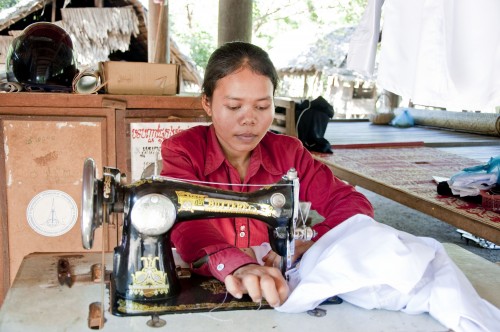IRDEP-KC – For more than twenty years, Hang Sinuon experienced her fatherless childhood with her mother and three other siblings. Sinuon, a third child in the family, worked very hard with her siblings to make money to support the family.

Her 40-year-old mother owns about one hectare of rice paddy. But, the rice yield she gets each year from the paddy is not enough for her whole family consumption. To subsist, her mother bought fish from the market to stew for sale. Sinuoun sold Num Kong, a doughnut-like Cambodian snack, which was made by her mother, at school in the morning when she was free from her afternoon class; and her three brothers went fishing or catching frogs for food and sales. All the incomes they made were sometimes not enough for buying some rice and food to eat.
In late 2008, Sinuon was selected to attend a 6-month sewing training course at Tuek Phos district town of Kampong Chhnang province. The course supported by LWF Cambodia. With a contribution of $35 from LWF and combined with her own saving of $10, Sinuon was able to buy a sewing machine, a pair of scissors, a tailor’s wooden ruler and a measuring tape.
Sinuon said that after her graduation in mid 2009, she started her sewing business at her home in Tang Thnong village, Chieb commune in Tuek Phos district. But, her business was not so good because she lacked some capital for buying cloths to make clothes for sales. Her income from the business was very low over the past second half of 2009 because the orders she got from her clients included mending torn clothes and changing trousers zips only.

In early 2010, Sinuon decided to borrow 120,000 riels ($30) from the Village Bank in her village to expand her sewing business. The Bank—established under LWF’s support, but owned by poor villa-ger members and managed by a committee elected from the members—charged her the interest rate of 3 percent per month, the rate agreed by all members.
She used the loan to buy some diffe-rent kinds of cloth to reserve for new orders. “When we have the cloths on hand, it is easy for the clients to choose the cloth they like and place orders right away,” she said, adding that for those who had their own cloth then she charged them for the fees. She could earn a net income of $1 from a total charge of $5 for one man’s shirt she made.
“My living condition now is much better than before. My family has enough rice and better food to eat,” she said, ad-ding that the incomes she earned from the past two years were significant to cover the expense of the family. Previously, when she ran out of rice, she had to borrow from other people in the village. Beyond covering all the expenses in the family, she could make a saving of $50 for herself from the business as of 2011. To secure her saving plan, she deposited all her savings in the Village Bank.
When she is free from her work, Si-nuon, 25, helps her mother do farming jobs and look after the pigs and chickens.
“I am very happy now because I have my own business and I can make incomes from it,” she said.
She said that when she gained enough experience from the work she would expand her business by purchasing a broidery machine and five more sewing machines for teaching students in the future.
For more information, please, contact Leak Ratna (Mr.), LWD Communication Coordinator | E-mail:ratna@lwd.org.kh | Phone: 012 819 121
